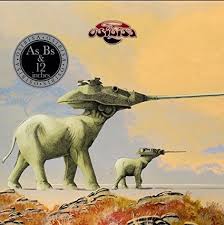If ever there was a musical collective that defined and inspired the African diaspora in its besieged infancy, then Osibisa were it; the lightning rod, the benchmark, the precious Constructivist Molotov Cocktail that lit the way and suggested communication was possible between disparate strands of Africans, African-Americans, Carribeans, and the Western world. From the late 1950s to Osibisa’s original inception in 1969, tensions existed between the nascent, displaced African community in Britain – centred mostly in London and Liverpool – and West Indian Islanders lured to work in Britain by the promise of streets lined with gold. Residual embers still flicker briefly to this day. Unification through music was largely only due to African Americans and their soulful outpourings before and during the civil-rights protest era. Like the late Fela Anikulapo Kuti, who was a contemporary, Teddy Osei relocated to London to study (one of the few ways Africans made it abroard in the post-colonial era). And the Ghanaian maestro formed Osibisa with three countrymen, a Grenadian, an Antiguan and a Trinidadian, later adding two Nigerians – the African diaspora’s first global musical force. No Osibisa, no world music. This would possibly still be a near-impossible feat today.
Teddy Osei, Sol Amarfio, Marc Tontoh, black radical Spartacus R and more – in a complicated and shifting line-up, of which Osei remains bandleader to this day – are Osibisa. Many have fallen by the wayside and died, mostly of natural causes, but Singles As Bs & 12 Inches is a completist’s dream: echoes of various musics pot-pourried into a totally seamless whole that doesn’t necessarily reward chin-stroking analysis. Light-hearted in part, heavy-handed in others; here is a legacy of a group who have gone beyond various genre restrictions to emerge as a party machine of sorts. The irony of course being that Osei and company landed head-first in the mainstream of things and stayed there for decades.
Time-travel to West Africa in 1976 and the early stirrings of the disco era with Osibisa. Predating the CD era and slightly reduced frequency-wise by the advent of MP3s and Soundclouds, Singles As… collects songs first heard on scratchy 7" singles, as the disco era signposts the introduction of 12" singles and a way for music to now breathe, lope around and surround dancers. Always current, a trademark of the African diaspora, earlier threnodies like the rapturous ‘Aiko Biaye’, and the percolating talking drum and dance-beat pitter-patter of ‘Dance The Body Music’, which stands outside time, introduced Ghanaians, Nigerians and others to radio and dance-floor communication – the talking drums as ancestral spirits speaking in tongues; deceptively simple lyrics and chants as exhortations; and, as time draws on, synthetic drums as early examples of mental programming and memory triggers. Sometimes, this all leads to slight memory erasure: forgetting hardship and more in the sun.
With their beginnings paralleled by advances in the now-derided ‘progressive rock’ scene in rock & roll, Osibisa, signed to mainly major labels (though later independent), hit on the masterstroke of employing Roger Dean for their cover art. Paintings of flying elephants became a semi-psychedelic trademark, as Dean, best known for his Yes artwork, takes a walk to the precipice of his mind. The A-sides collected here, like the scintillating call-and-response verbals of ‘Sunshine Day’, are devoted equal attention to detail as the B-sides, and it’s a matter of convenience they’re metaphorically in bed together, a fact somewhat rectified by the introduction of CDs, as evinced on this four-decade, four-CD set.
What Osibisa make possible and witness is a body blow to racists everywhere, and the gradual development of a stronger sense of self in Africa and beyond. This is no fancy theory. A tune like ‘The Coffee Song’ ("they’ve got an awful lot of coffee in Brazil") suggests a Samba-drenched workout, whilst there is definitely a lingering sense of homesickness everywhere. For Ghanaians and others trying to work in a sometimes hostile, sometimes openly racist London – the grooves, the jazz breaks, the Latinate shuffles posit a musical language that could definitely salve the balm of homesickness in others.
Basically, Osibisa crossed-over in a time before such a reductive phrase was coined and yet remained political and defiant, whilst making millions dance and sway and shimmer across the globe. Teddy Osei has to be recognised as a master bandleader, and, if not too fanciful, a conductor; a lightning rod that put Osibisa in the most unexpected places dotted around the globes hotspots, cold-spots, shebeens, shanty towns, estates, flats, penthouses and skyscrapers.
<div class="fb-like" data-href="http://thequietus.com/articles/19298-osibisa-singles-as-bs-12-inches-review” data-width="550" data-show-faces="true" data-send="true">


